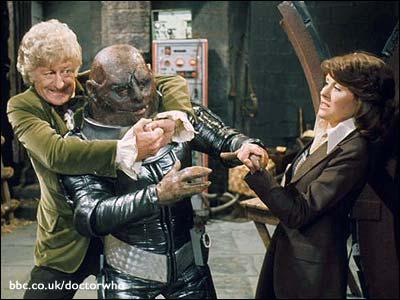Written by Robert Holmes
Directed by Alan Bromly
This is an interesting story of firsts: the first serial of Season 11, the first serial with Sarah Jane Smith as the Doctor’s companion, the first appearance of the Sontarans, and even the first serial to feature the iconic diamond-shaped logo that even extremely casual fans of the classic era like myself recognized. But in a way, it’s also the beginning of the end, as the final season of the Third Doctor’s tenure begins.

This is a serial with clear contrasts. The good elements are really, really good, and the bad elements are relentlessly terrible. There’s practically no in-between. My experience with this relatively short (four episode) serial was a constant string of smiles and winces. I suppose it’s only fair to talk about the things I liked first, since they helped to keep me interested enough to see how it ended.
Sarah Jane has a strong introduction here, noted largely for her strident feminism and her initial assumption that the Doctor was the bad guy. She’s not someone who was with UNIT from the start, or some ditzy young woman without anything better to do than chase after the Doctor. She gets involved because she’s hunting down the truth, and her world is suddenly and forever expanded in ways she never anticipated. Her hunger to see more is palpable, and I never once questioned her motives. It’s a better introduction for a Companion than any other comparable introduction during that era (including the UNIT supporting cast).
It’s very strange seeing Sarah Jane with the Third Doctor, because of course, she’s the iconic Companion to the Fourth Doctor. Even I remember seeing her in the occasional stray episode on PBS in my early years. I’d say that she worked well enough with Jon Pertwee, but one can tell that he is struggling a bit to overcome his reluctance for any co-star other than Katy Manning. (Pertwee manages to stay engaged for most of this serial, but I can already see him on the path towards departure.)
Another big highlight is the character of Linx, the Sontaran at the heart of the story. I was only familiar with the NuWho incarnation of the Sontarans, so I really had no idea what to expect. I was pleasantly surprised to see that the characterization was very similar, and that even the relatively cheap makeup work at the time was excellent. I really like how the Sontaran philosophy came through loud and clear, and how casually Linx treated human life and welfare in favor of his own needs.
Of course, Linx was crafted to serve as commentary on the casually violent and bloodthirsty warrior culture of Western history, a time that we emulate and romanticize more than we would like to admit. There is even a hint of commentary on the “military mentality” of UNIT in the process. Sadly, this is undercut by the somewhat farcical treatment of certain elements of the story and key characters, which contributed greatly to the tonal inconsistencies.
I was shocked to discover that a great many people found Irongron to be hilarious. I found him to be enormously grating and over the top, to the point of almost single-handedly ruining the whole production for me. I can only imagine that writing him as a joke was meant to be comic relief of a sort.
Unfortunately, the social commentary at the heart of the story requires that Irongron be entirely serious in his attitudes and beliefs, as a representative of the culture. By making Irongron so ridiculously silly from the very start, he comes across as unbelievable and clearly fictional, so the commentary seems a bit overwrought rather than pointed. It’s one thing to have Irongron embrace the mores and culture of his times with fervor; it’s another to feel like the Doctor and Sarah Jane have fallen into a Monty Python skit.
Even the underlying message is a bit problematic. When the Third Doctor era began with the Doctor reluctantly agreeing to work as a consultant to UNIT, there was something of a necessary balance. An organization like UNIT was not unlike Starfleet within the Federation on “Star Trek”: a military force that existed to deal with situations where peaceful resolution may not be a realistic option.
Considering that the Third Doctor era saw production and first run through the latter stages of the Vietnam War, itself a proxy conflict within the larger Cold War, the overall premise made sense: communicating the necessity of military action, while offsetting that with the cool wisdom of a Time Lord who could see the hidden potentials for peaceful resolution. Even if the Third Doctor appeared to be part of the Establishment, his attitudes reflected a certain public mindset.
But that was Season 7, and by Season 11, the balance and nuance was gone. The Doctor’s strong opposition to purely military solutions, instead of representing one side of a difficult debate, became the default “correct” answer. The Brigadier went from being a pragmatic soldier to a walking stereotype, whose “limited military mind” couldn’t perceive past the barrel of his own gun. By this point, all the nuance is gone, and Irongron is just another example of how the “military mentality” is portrayed as hopelessly savage and unsophisticated.
The end result is a bit of a shame, because with a few key changes, this could have been an excellent story. In fact, this is one of those occasions where the effects really don’t factor against the serial at all. It’s all in the writing and the over-the-top acting, which just undermines the whole production from the start.
Writing: 1/2
Acting: 1/2
Direction: 2/2
Style: 1/4
Final Rating: 6/10

